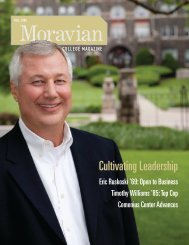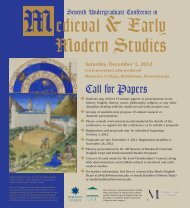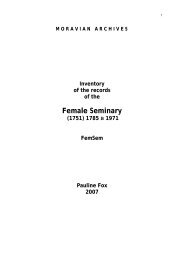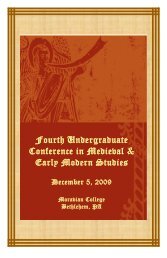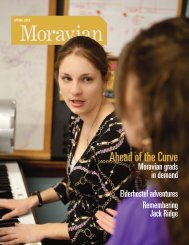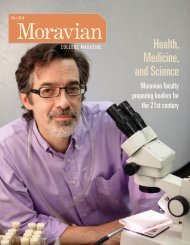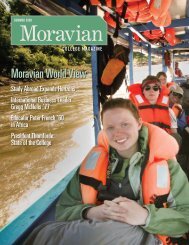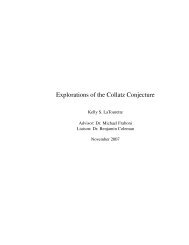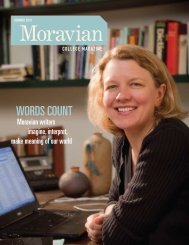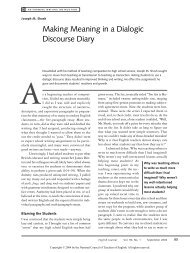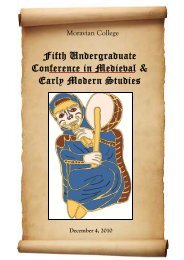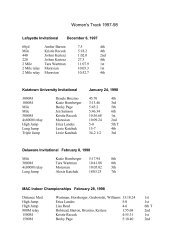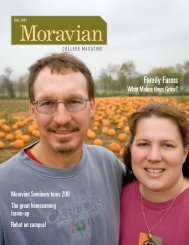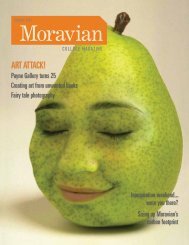Big Man on Campus - Moravian College
Big Man on Campus - Moravian College
Big Man on Campus - Moravian College
Create successful ePaper yourself
Turn your PDF publications into a flip-book with our unique Google optimized e-Paper software.
prelude<br />
Larger-than-life Ideas<br />
MORAVIAN COLLEGE MAGAZINE WINTER 2007<br />
My Lisb<strong>on</strong> Less<strong>on</strong>s<br />
Peter Cunha ’07 explores Portugal and his past<br />
I believe you have to stay busy. You always have to be involved in<br />
something whole-heartedly, always evolving, always advancing. For<br />
college kids, that means an internship in the summer. The Career<br />
Center at <strong>Moravian</strong> has c<strong>on</strong>vinced me that experience is necessary if<br />
I want to progress successfully to the next level of my life. A previ-<br />
ous internship advanced my understanding of journalism. This time,<br />
I wanted an experience relating to my other major, internati<strong>on</strong>al<br />
business. And I wanted to see if I really could survive <strong>on</strong> my own in<br />
another country.<br />
My internship was six weeks at the Luso-American Foundati<strong>on</strong><br />
(FLAD, Fundação Luso-Americana para o Desenvolvimento), in Lisb<strong>on</strong>.<br />
FLAD was founded in 1986 by the Portuguese government to help pro-<br />
mote relati<strong>on</strong>s between the United States and Portugal. The two nati<strong>on</strong>s<br />
share a diplomatic alliance that’s<br />
<strong>on</strong>e of the oldest—if not the old-<br />
est—in American history. This was<br />
the first time that some<strong>on</strong>e outside<br />
of my family invested so much in me<br />
in more than just a financial way.<br />
I worked in Lisb<strong>on</strong> in the Es-<br />
trella neighborhood. <str<strong>on</strong>g>Man</str<strong>on</strong>g>y interna-<br />
ti<strong>on</strong>al embassies are located there, including the U.S. embassy, which<br />
is just across the street. Our building was <strong>on</strong>e of the first built in the<br />
area after the 1755 earthquake that destroyed a large part of Lisb<strong>on</strong>.<br />
My office had an unbelievable view of the Tejo River. One of my proj-<br />
ects, an analysis of American students studying abroad in Portugal,<br />
resulted in the largest document I’ve ever produced—78 double-<br />
spaced pages. It took a lot of research and analysis, but working for<br />
people I admired and respected made it enjoyable.<br />
I’m the s<strong>on</strong> of immigrants who left Portugal in 1968. The week-<br />
ends were great for discovering my ancestral stomping grounds<br />
firsthand. I went to my folks’ home town. We still have family there.<br />
I saw my paternal grandparents’ graves, my dad’s crib, and I did<br />
some genealogical research. I visited the house where my dad grew<br />
up, and the neighborhood he lived in before he left for America. The<br />
area’s still very rural. It’s easy to imagine my roots because the way<br />
of life there hasn’t changed much. I found out that my dad’s house,<br />
now occupied by my aunt, has been in the family for six generati<strong>on</strong>s.<br />
Most Americans know the nati<strong>on</strong>ality of their ancestors, and a few<br />
lucky <strong>on</strong>es know where in that nati<strong>on</strong>—in what town or regi<strong>on</strong>—their<br />
Left: Peter Cunha at Lisb<strong>on</strong>’s Parque Eduardo Setimo.<br />
right: Rooftops of Lisb<strong>on</strong>, World Cup euphoria, Peter and co-workers.<br />
><br />
family originated. But I know exactly where my ancestors lived some<br />
four hundred years ago. To find out that you’re part of something that<br />
extends so far back in time is a new discovery about yourself.<br />
I’m a soccer nut, and when the World Cup tournament is going<br />
<strong>on</strong>, so is every<strong>on</strong>e in Portugal. I experienced the World Cup in a soc-<br />
cer-crazy nati<strong>on</strong>, <strong>on</strong>e that went far in the tourney at that. Portugal’s<br />
fourth-place finish that summer was its best in 40 years, and I was<br />
there for the final five matches. It was the best. When the team w<strong>on</strong><br />
against Holland and England, every<strong>on</strong>e headed to the m<strong>on</strong>ument<br />
to Marques de Pombal* in the city’s center. I was stati<strong>on</strong>ed down<br />
the street, and after every victory I’d march down there and cheer<br />
with the rest of Lisb<strong>on</strong>’s populati<strong>on</strong>. People waving flags, rigging up<br />
their cars so that their automobiles look like caravels—15th-century<br />
explorers’ ships—with the Portuguese<br />
flag as a sail . . . it was a phenomen<strong>on</strong><br />
that just doesn’t exist in the States as<br />
far as soccer is c<strong>on</strong>cerned.<br />
After being transplanted for those<br />
six weeks, I learned skills that can’t<br />
be transmitted in any other way.<br />
Working in a foreign nati<strong>on</strong> teaches<br />
you to functi<strong>on</strong> successfully within another culture, something I feel<br />
many Americans d<strong>on</strong>’t understand. You can read about social differ-<br />
ences in a textbook, but you have to practice them or that knowledge<br />
is useless. My generati<strong>on</strong> is going to have to deal with c<strong>on</strong>cepts like<br />
globalizati<strong>on</strong> and the European Uni<strong>on</strong>. After this internship, I’m very<br />
familiar with these noti<strong>on</strong>s.<br />
And I learned a lot about me that I didn’t know before. I grew up<br />
with very little knowledge of my great Portuguese heritage. Getting<br />
thrown into it headfirst made me come out with a new appreciati<strong>on</strong><br />
of names like Vasco da Gama, Fernando Pessoa, Luis Camoes. I came<br />
to appreciate an element of my pers<strong>on</strong>ality that helps me understand<br />
who I am. Since I was little, I’ve always been looking at pictures in<br />
textbooks or watching movies and wishing that <strong>on</strong>e day I could go<br />
there and see those places. I’ve always had this interest in what’s out<br />
there. Maybe that’s just the Portuguese in me: the blood of the explorers<br />
still going str<strong>on</strong>g. W<br />
Prelude features stories of <strong>Moravian</strong> <strong>College</strong> community members in their own words.<br />
Send your submissi<strong>on</strong>s or suggesti<strong>on</strong>s to: rickc@moravian.edu.<br />
* The statesman noted for his leadership after the 1775 earthquake. –eds.<br />
WINTER 2007 MORAVIAN COLLEGE MAGAZINE



